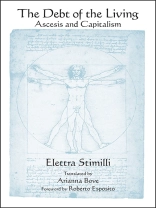An analysis of theological and philosophical understandings of debt and its role in contemporary capitalism.
Max Weber’s account of the rise of capitalism focused on his concept of a Protestant ethic, valuing diligence in earning and saving money but restraint in spending it. However, such individual restraint is foreign to contemporary understandings of finance, which treat ever-increasing consumption and debt as natural, almost essential, for maintaining the economic cycle of buying and selling.
In The Debt of the Living, Elettra Stimilli returns to this idea of restraint as ascesis, by analyzing theological and philosophical understandings of debt drawn from a range of figures, including Saint Paul, Schmitt and Agamben, Benjamin and Marx, Nietzsche and Freud, and Foucault. Central to this analysis is the logic of ‘profit for profit’s sake’-an aspect of Weber’s work that Stimilli believes has been given insufficient attention. Following Foucault, she identifies this as the original mechanism of a capitalist dispositif that feeds not on a goal-directed rationality, but on the self-determining character of human agency. Ascesis is fundamental not because it is characterized by renunciation, but because the self-discipline it imposes converts the properly human quality of action without a predetermined goal into a lack, a fault, or a state of guilt: a debt that cannot be settled. Stimilli argues that this lack, which is impossible to fill, should be seen as the basis of the economy of hedonism and consumption that has governed global economies in recent years and as the premise of the current economy of debt.
विषयसूची
Foreword to the English Translation
Preface to the English Translation
Acknowledgments
Introduction
1. The End in Itself of the Economic Enterprise
2. Oikonomía and Asceticism
3. The Theological Construction of the Government of the World
4. Voluntary Poverty on the Market
5. Capitalism as Religion
6. A Philosophical Critique of Asceticism
7. The Spirit of Capitalism and Forms of Life
Notes
Bibliography
Index
लेखक के बारे में
Elettra Stimilli is research fellow of theoretical philosophy at Scuola Normale Superiore in Pisa, Italy. Arianna Bove is the translator of many books, including Factory of Strategy: Thirty-Three Lessons on Lenin, by Antonio Negri.












